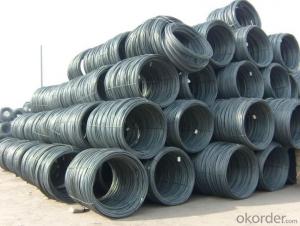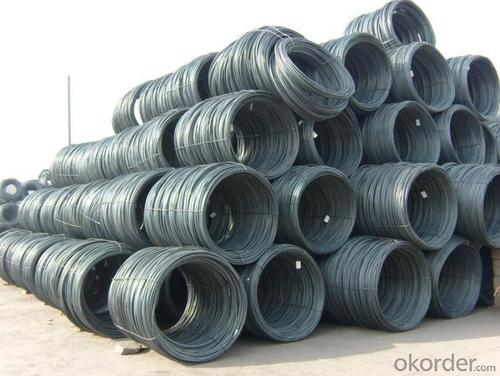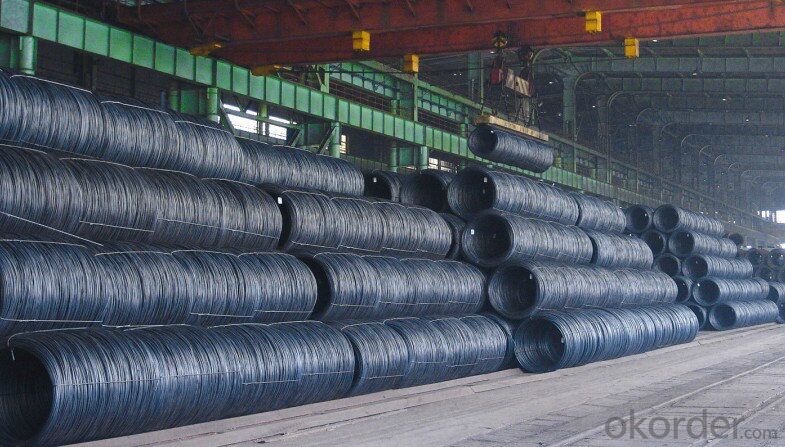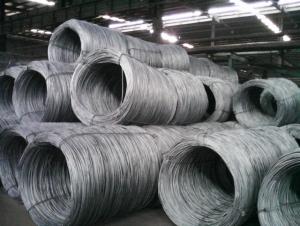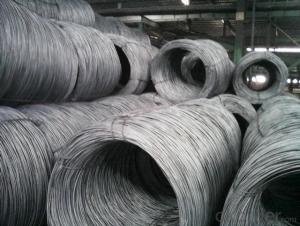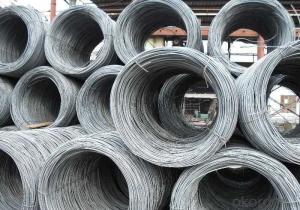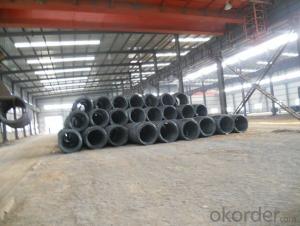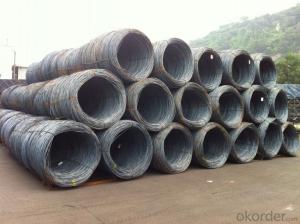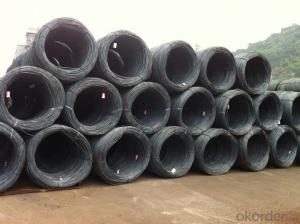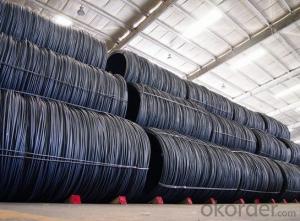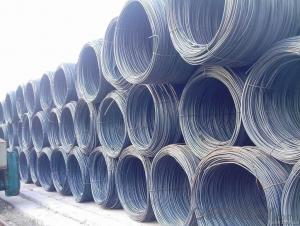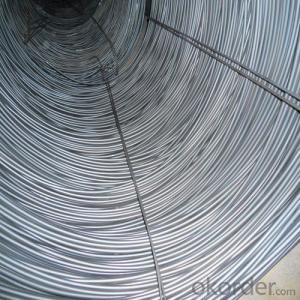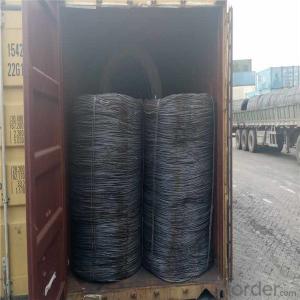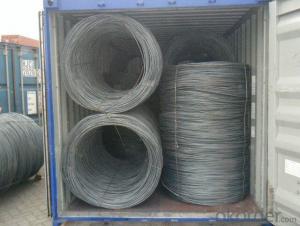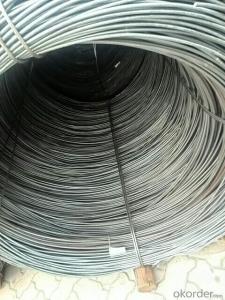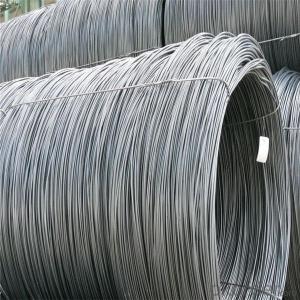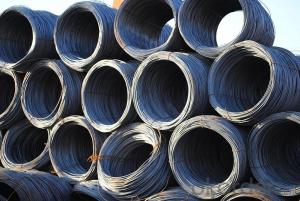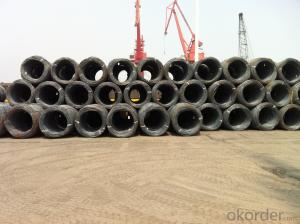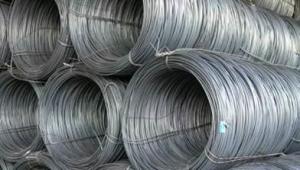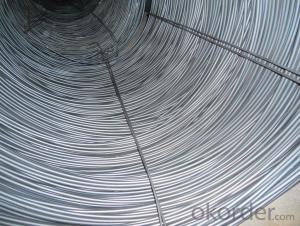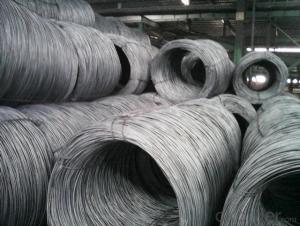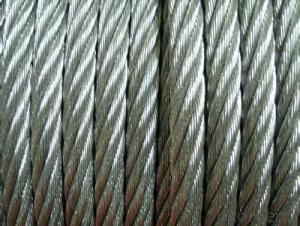high quality SAE1006 / SAE1008B Low Carbon Steel Wired Rod
- Loading Port:
- Tianjin
- Payment Terms:
- TT OR LC
- Min Order Qty:
- 25 m.t.
- Supply Capability:
- 5000 m.t./month
OKorder Service Pledge
OKorder Financial Service
You Might Also Like
Specification
Specifications of Steel Wire Rod in Coil:
Steel Grade: Q195/235, SAE1006-1018B Standard: ASTM, GB
Diameter: 5.5mm, 6.5mm, 7mm,8mm,9mm,10mm,12mm,14mm
Type: Drawn Wire Alloy or Not: Alloy Brand Name: HSKY
Technique: Hot Rolled Place of Origin: China Mainland
Chemical Composition:(Please kindly find our chemistry of our material based on SAE1006B and SAE1008B as below for your information)
High carbon/Low carbon/common carbon Steel wire rod | With boron for rebate tax |
Grade | SAE1006B SAE1008B SAE1018B |
Package | In coil ,in bundle, |
Coil weight | about 2000kg-3000kgs |
Size: | 5.5mm 6.5mm 8mm 10mm 12mm 14mm 16mm |
Types | High Carbon ,Low carbon ,Common carbon |
Exported Country | South Korea,Vietnam,Indonesia,Myanmar,Philippines and Afrca,Ect |
Delivery term: | within 30 days after receive the LC |
Payment Term: | LC at sight ,LC 30-120 days after B/L date, TT payment |
The Standard of Physical Properties:
Grade | Chemical Composition(%) | |||||
C | Mn | Si | S | P | Cr | |
SAE1006 | 0.03~O.07 | ≤0.32 | ≤0.30 | ≤0.045 | ≤0.040 | >0.30 |
Mechanical properties | ||||||
Yield strength(N/mm2) | Tensile strength(N/mm2) | Elongation(%) | ||||
250-280 | 350-380 | ≥32 | ||||
Grade | Chemical Composition(%) | |||||
C | Mn | Si | S | P | Cr | |
SAE1008 | 0.10max | 0.3~O.50 | 0.15max | 0.050max | 0.040 max | 0.30 min |
Mechanical properties | ||||||
Yield strength(N/mm2) | Tensile strength(N/mm2) | Elongation(%) | ||||
≥195 | 315-430 | ≥30 | ||||
Usage and Applications of Steel Wire Rod in Coil:
After hot-rolled the products shaped into coil and delivery as finished product, including round, square, rectangular, hexagonal and so on, Since most of the products are round, it is generally called wire rod. Steel wire rod is widely used in construction and manufacturing. Steel wire rod is mainly used for reinforcement of reinforced concrete and welded structure or reprocessed (roberts, nail etc) materials, especially used to produce wire drawing, welding electrode, nails,spring, electronic, precise machinery parts and so on.
Packaging & Delivery of Steel Wire Rod in Coil:
Packaging Detail: products are packed in coil and then shipped by container or bulk vessel
Each coil weight: 2-3MT
Delivery Detail: within 45 days after received deposit or LC.
Label: to be specified by customer, generally, each bundle has 1-2 labels
Trade terms: CFR, CIF
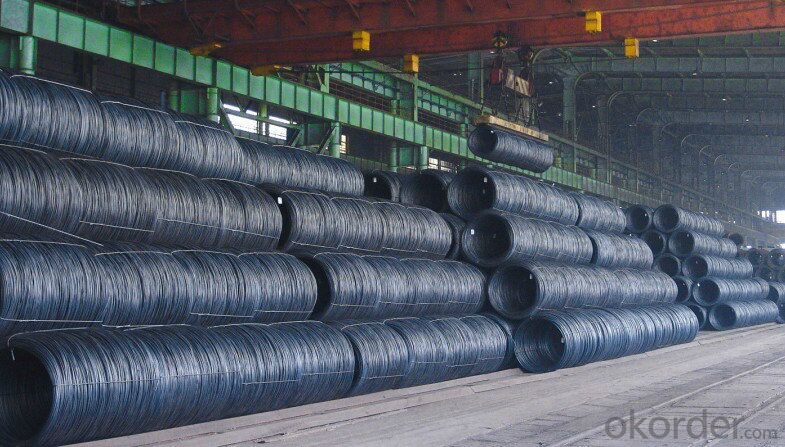
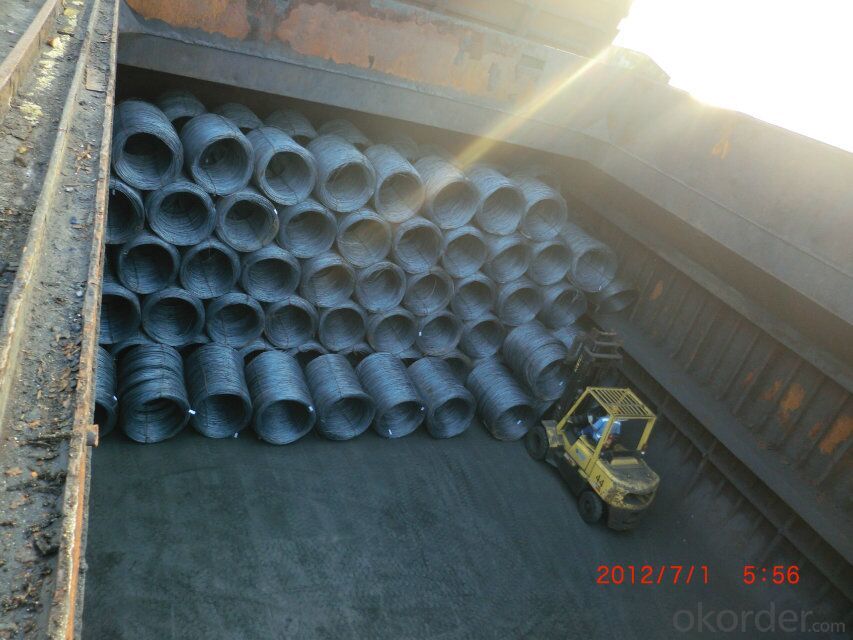
- Q: What are the different chemical analysis techniques for steel wire rod?
- There are several chemical analysis techniques used for steel wire rod, including spectroscopy, X-ray fluorescence (XRF), atomic absorption spectroscopy (AAS), inductively coupled plasma (ICP) analysis, and wet chemical analysis. These techniques help determine the composition and impurities present in the steel wire rod, ensuring its quality and adherence to industry standards.
- Q: What are the different cutting methods for steel wire rod?
- Steel wire rods can be cut using various methods, depending on specific requirements and desired outcomes. Some commonly used cutting methods include: 1. Shearing: Wire rods can be cut using shears or a cutting blade either manually or with machinery, depending on the thickness and length of the rod. 2. Sawing: Saw blades or band saws are used to cut through thicker wire rods or when a precise and clean cut is needed. 3. Abrasive cutting: This method involves using an abrasive disc or wheel to grind through thin wire rods, providing a smooth and precise cut. 4. Flame cutting: Also known as oxy-fuel cutting, this thermal method uses a high-temperature flame created by combining oxygen and a fuel gas. It is commonly used for thick wire rods and offers a fast and efficient cutting solution. 5. Laser cutting: By using a focused laser beam to melt and vaporize the wire rod, laser cutting provides highly precise and efficient cuts. It is often employed for intricate patterns or when a high level of precision is required. These are just a few of the available cutting methods for steel wire rods. The choice of method depends on factors such as the rod's thickness and length, desired outcome, and available equipment and resources.
- Q: What are the common production processes for vanadium-coated steel wire rod?
- The common production processes for vanadium-coated steel wire rod typically involve several steps. First, the steel wire rod is cleaned and pre-treated to remove any impurities or contaminants. Then, it undergoes a process called vanadization, where a layer of vanadium is applied onto the surface of the wire rod through a chemical or electroplating method. This vanadium coating provides enhanced properties such as increased strength and corrosion resistance. Finally, the wire rod is subjected to further treatments such as annealing, cooling, and quality testing to ensure it meets the desired specifications and standards before being used in various applications.
- Q: How is steel wire rod used in the manufacturing of wire for medical devices?
- Steel wire rod is an essential component in the manufacturing of wire for medical devices. It serves as the base material that undergoes various processes, such as drawing, annealing, and coating, to produce the final wire used in medical devices. The high strength and durability of steel wire rod ensure that the resulting wire is capable of withstanding the rigorous conditions and requirements of medical applications, making it a crucial element in the production of safe and reliable medical devices.
- Q: How is steel wire rod used in the production of wire forms?
- Steel wire rod is used in the production of wire forms as the primary raw material. It is first drawn through a series of dies to reduce its diameter and increase its length. This process gives the wire its desired shape and strength. The wire forms are then used in various applications such as springs, clips, hooks, and other metal components.
- Q: How are steel wire rods used in the manufacturing of wire mesh for reinforcement?
- Steel wire rods are widely used in the manufacturing of wire mesh for reinforcement due to their exceptional strength and durability. These rods serve as the primary raw material for wire mesh production. The process begins by heating the steel wire rods to a high temperature in order to soften them. This makes it easier to shape and manipulate the rods into the desired wire mesh configuration. The softened rods are then passed through a series of dies, which gradually reduce their diameter and increase their length. This process is known as drawing, and it helps improve the mechanical properties of the wire rods, such as tensile strength and ductility. Once the wire rods have been drawn to the desired size, they are further processed through a series of specialized machines to create the wire mesh. These machines weave or weld the individual wires together, forming a grid-like pattern that is commonly used for reinforcement purposes. The wire mesh is carefully designed to provide structural support and enhance the strength of various construction materials, such as concrete. Wire mesh reinforcement is commonly used in construction projects to prevent cracking, improve load-bearing capacity, and enhance the overall durability of structures. It is extensively used in concrete slabs, walls, columns, and foundations. The steel wire rods used in the manufacturing of wire mesh provide the necessary strength and structural integrity to withstand heavy loads and resist tension forces. In summary, steel wire rods play a crucial role in the manufacturing of wire mesh for reinforcement. Their high strength, durability, and ability to be shaped make them an ideal material for creating wire mesh products. Through a series of processes, the wire rods are transformed into wire mesh that provides structural support and enhances the strength of various construction materials.
- Q: What are the typical applications of steel wire rod?
- Steel wire rod is a versatile material that finds its application in various industries. Some of the typical applications of steel wire rod include: 1. Construction: Steel wire rod is commonly used in construction applications such as reinforcing concrete structures. It provides strength and durability to the construction materials, making them more resistant to cracking and bending. 2. Manufacturing: Steel wire rod is extensively utilized in the manufacturing sector for producing a wide range of products. It is used in the production of nails, screws, springs, cables, ropes, wire mesh, and various other hardware and industrial products. 3. Automotive industry: Steel wire rod is widely used in the automotive industry for manufacturing components like suspension springs, seat springs, wire harnesses, and tire reinforcement. Its high strength and flexibility make it an ideal choice for these applications. 4. Electrical industry: Steel wire rod is used in the electrical industry for producing cables and wires. It provides excellent conductivity and durability, making it suitable for transmitting electric power or signals efficiently. 5. Agriculture: Steel wire rod is utilized in the agricultural sector for various purposes. It is used in fencing, trellis systems, and vineyard wires to provide support and protection to crops and livestock. It is also used in manufacturing agricultural equipment like wire fencing, gates, and animal enclosures. 6. Packaging and fastening: Steel wire rod is employed in the packaging industry for manufacturing wire for packaging purposes, such as baling wire for securing bundles or tying products together. It is also used in fastening applications like wire ties and clips. 7. Furniture and appliances: Steel wire rod is used in the production of furniture and appliances, such as wire shelves, racks, and frames. It provides strength and stability to these products, making them durable and long-lasting. Overall, steel wire rod has a wide range of applications due to its excellent strength, flexibility, and durability. Its versatility makes it an essential material in various industries, contributing to the development and improvement of numerous products and structures.
- Q: What are the common production processes for osmium-coated steel wire rod?
- The common production processes for osmium-coated steel wire rod typically involve several steps. First, the steel wire rod undergoes a thorough cleaning process to remove any impurities or contaminants. Then, it is pre-treated with a solution to enhance adhesion between the steel and osmium coating. Next, the wire rod is dipped into a bath containing osmium, where a thin layer of osmium is deposited onto the surface through electroplating or immersion methods. After the coating process, the wire rod is thoroughly rinsed and dried to ensure the osmium layer is uniform and adheres tightly to the steel. Finally, the osmium-coated steel wire rod may undergo additional processing, such as annealing or machining, depending on the desired end-use application.
- Q: How is steel wire rod tested for impact resistance?
- Steel wire rods are tested for impact resistance through a process called Charpy V-notch testing. This involves placing a notched sample of the wire rod in a pendulum-type machine and striking it with a swinging hammer. The energy absorbed by the sample during impact is measured, indicating its resistance to sudden shocks or impacts.
- Q: How is steel wire rod used in the production of wire for suspension bridge cables?
- Steel wire rod is a crucial component used in the production of wire for suspension bridge cables. The wire rod is made from high-quality steel and is typically produced through a process called hot rolling. To create wire for suspension bridge cables, the steel wire rod undergoes several stages of processing. Firstly, the wire rod is heated and then passed through a series of rollers, which gradually reduce its size and shape it into a long, continuous wire. This process is known as wire drawing. The resulting wire is then further processed to enhance its strength and durability. It undergoes a heat treatment process, such as annealing, to improve its mechanical properties. This treatment helps increase the wire's tensile strength, ensuring it can withstand the immense loads and stresses experienced by suspension bridge cables. Once the wire has been appropriately treated, it is then carefully woven and braided to create the final suspension bridge cable. Multiple wires are twisted together to form strands, and several strands are then twisted together to create a larger cable. This intricate weaving process ensures that the cable is strong, flexible, and resistant to corrosion. The use of steel wire rod in the production of suspension bridge cables is crucial due to its exceptional strength-to-weight ratio. Steel is renowned for its high tensile strength, making it an ideal material for supporting heavy loads over long spans. Additionally, steel wire rod offers excellent resistance to corrosion, ensuring the longevity and structural integrity of suspension bridge cables. Overall, steel wire rod plays a vital role in the production of wire for suspension bridge cables, providing the necessary strength, durability, and flexibility required for these critical infrastructure components. Its versatility and reliability make it a preferred material choice in the construction of suspension bridge cables, ensuring the safety and functionality of these impressive engineering marvels.
Send your message to us
high quality SAE1006 / SAE1008B Low Carbon Steel Wired Rod
- Loading Port:
- Tianjin
- Payment Terms:
- TT OR LC
- Min Order Qty:
- 25 m.t.
- Supply Capability:
- 5000 m.t./month
OKorder Service Pledge
OKorder Financial Service
Similar products
Hot products
Hot Searches
Related keywords
